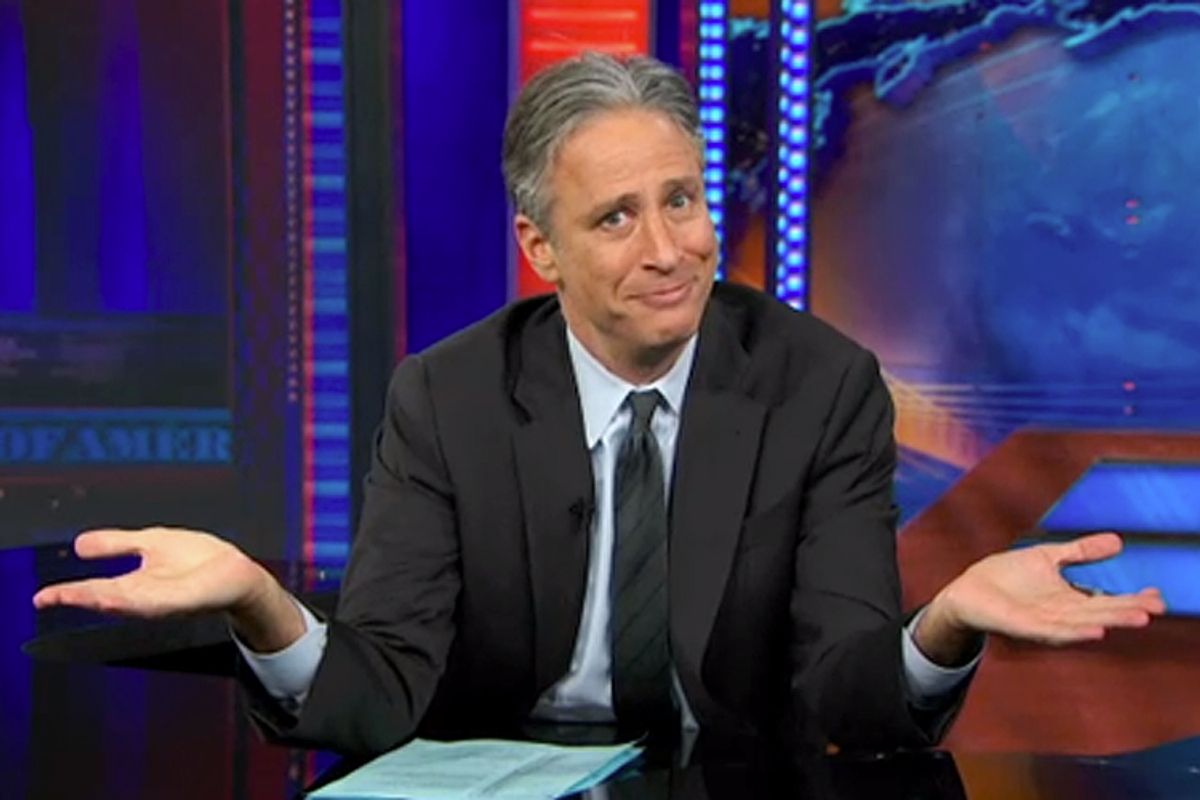Jon Stewart recently talked with New York magazine's Chris Smith on his directorial debut with the film "Rosewater." Smith asked Stewart about the film but then quickly moved on to the questions all journalists want Stewart to answer: Does his satire pack enough of a punch? Is he replacing the traditional news with fake news? And, most important, can his show influence politics?
As always, and as expected, Stewart gave the range of answers any good satirist would: He told Smith that he was like a dildo rolled in glitter and that he was also like Bob Dylan. The point? Stewart is exactly what you want him to be.
Since the recent rise of satire news as a major presence in the U.S. media, journalists, critics and commentators have consistently asked whether satire has any real power to influence politics. Stewart has been accused of being too tame and also too powerful. He is too funny and not funny enough. He tells us what to think and is too wishy-washy. His satire is taking over the news and it isn’t a serious source of the news.
But all of these conclusions miss the point. Satire news can’t be the traditional news and it doesn’t want to be. Satire is not about telling the audience how to think and it is not about directly intervening in politics. Instead, the goal of satire is to tell you to stop swallowing the drivel offered by politicians and the mainstream news media and start thinking for yourself. As Stewart puts it in the New York mag interview:
“I do consider this show and this movie a conversation that we are having with a culture and with people. But it is definitely much more passive. It’s like when people say Bob Dylan changed the world in the ’60s. He wrote some good tunes, and some people who did actually end up changing the world probably hummed them a lot, but that’s not what changed the world.”
What changes the world? Citizens do, not satirists. But here is the catch. The satirists are a provocation: They get the ball rolling. They point out to their audience that things are not right and that we need to reject the status quo. From Jonathan Swift to Ben Franklin to Jon Stewart the message is the same. Don’t trust the party line because it’s not just stupid, it’s dangerous.
And this is where the dildo line comes in. Smith asked Stewart whether comedy has overtaken traditional news. Stewart answered by explaining that the two were not opposing poles, but that it was clear that satire news had gained more public trust than mainstream news.
“We are, in some ways, the cheap protest vote. I remember people said I was voted the fourth most trusted. But my name being in there was a fuck-you to everybody else. A dildo rolled in glitter would serve the same purpose as my name in that conversation.”
What do Dylan and a glitter-covered dildo have in common? They are both entertaining. And that’s the special secret to satire that so many miss. Stewart’s satire is not the critical commentary of Rachel Maddow and it doesn’t want to be. It is fun and funny. It isn’t straight news or politics and that is where its real potential lies. If it has power, it is the power to suggest to an audience that they should do something about existing structures of power, that they should turn off their TV and be more politically active, and that they should ask more of politicians and of the media that reports on them.
It never comes right out and says those things, though, and that is where the real art of satire steps in. Unlike a public intellectual such as Naomi Klein or Noam Chomsky, Stewart doesn’t tell his audience what to think or what to do. Instead he uses the art of irony. Irony depends on never saying exactly what you think. Like sarcasm, satire and snark, its goal is to draw attention to hypocrisy, folly or abuses of power and indirectly ask the audience to “get it.” As he puts it to Smith: “The tools we use are exaggeration, hyperbole, puns, imitation, ridicule. Sometimes they can cut through things in an easier way but generally in a more superficial way. It distills something to a more visceral element that does not generally present a grander picture.”
The grander picture, if there is one, is the job of the audience not the satirist. The key, though, is that the layered meaning of irony and satirical comedy requires critical thinking from the audience. Understanding irony demands that the audience infer meaning and draw conclusions. In a dumbed-down media world where politicians stir up hysteria over Ebola and the media simply ramps up the hype, satirical irony is like a breath of fresh air. It is critical and fun, and can’t be understood without active thinking on our part.
Satire offers no guarantees, though. As Stewart makes clear, he might be our generation’s Dylan or he might be nothing more than a pleasurable diversion. Or, then again, maybe he is both.

Shares